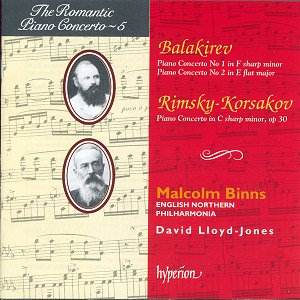The coupling of the Rimsky-Korsakov piano concerto
with the two Balakirev does not work well on this CD. Although Rimsky-Korsakov
is much indebted to Balakirev in terms of musical material for his main
theme (no.18 from Balakirev’s folksong collection published in 1866),
the real singular influence here is Liszt – particularly in terms of
structure with the unbroken movement form copied from Liszt’s second,
as well as a virtuosic style. The concerto is an excellent example of
the potential of musical development, using material derived from the
folksong for each of the movements, yet there is an air of artifice
about it – signs of the direction that Rimsky-Korsakov’s music was to
take – that adds a distinct superficiality to the music.
Rimsky-Korsakov, then, is firmly planted in one musical
corner whilst Balakirev is a world away, showing evidence of an array
of influence. For example, his second Piano Concerto has a Beethovenian
first movement yet introduces an exquisite Russian Orthodox Requiem
chant for the second movement – triumph followed in stark contrast by
mourning.
However. despite moments of brilliance in both his
concertos, I find the Balakirev are unconvincing, uncompelling, for
the simple reason that the composer himself was not interested enough
to finish them – both concertos were abandoned and the second only completed
posthumously by Sergei Liapunov (apparently in accordance with the composer’s
wishes, although it is not obvious whether these wishes are solely musical
or include a request that the work should be completed).
The interpretations of both are generally pleasing,
if unoriginal. The ENP accompany the piano well, although the strings
are not as lush as I would like. Binns occasionally makes one wonder
whether he is up to the challenge of these concertos – he doesn’t really
seem to want the music to go where it is headed and hence there is a
feeling of frustration, of being held back, often reflected in the inconstant
tempi.
He does display an endearing tenderness in the Rimsky-Korsakov,
although this quality is occasionally lessened by frivolity in – or
perhaps lack of concern over - the faster sections. The first Balakirev
is less successful, although in my opinion this may be more to do with
the original material – brash and unrefined, but without the sense of
deficiency which might be expected in a work originally written with
a second and third movement in mind.
Aside from these, the sound quality is good and clear,
as is balance between the orchestra and piano. The leaflet provides
good information, albeit brief, and as an introduction to the works,
it is a pretty good place to start.
Christa Norton
Visit
the Romantic Piano Concerto page


